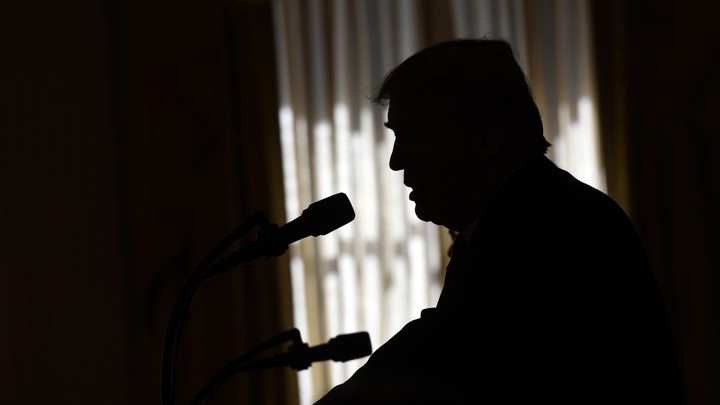From The Atlantic:
We’re Now in the Hot Zone for Impeachment
Few Democratic leaders have seemed less eager to impeach President Donald Trump than House Speaker Nancy Pelosi. She’s warned that the public doesn’t want it and the Senate would never go for it. But a rolling series of disclosures may force her to recalculate the politics. A report in The Wall Street Journaltoday, quickly confirmed by other major outlets, introduced an explosive new twist to a story that already had the trappings of one of the biggest threats yet to Trump’s presidency. The fresh details about Trump’s apparent effort to strong-arm Ukraine into investigating his political rival Joe Biden may have irreversibly pushed the president into the impeachment hot zone.
According to the Journal, in a phone call in July, Trump pressed Ukraine’s president, Volodymyr Zelensky, to investigate Biden’s son Hunter. Over and over, Trump urged Zelensky to work in tandem with his lawyer and confidant Rudy Giuliani, who has publicly accused Joe Biden of trying to interfere in the investigation of a Ukrainian gas company, on whose board Hunter Biden sat. (A Ukrainian official said there was no wrongdoing, the Journal reported.)
Little Trump says has the power to shock anymore, but his alleged behavior in this instance is head-spinning. It suggests that whatever the fallout for America’s standing in the world, he is willing to use his office as a weapon to damage the front-runner for the Democratic nomination, the man he could well face in a 2020 general election. It shows that, at some fundamental level, he may not grasp his responsibilities as head of state and the innate patriotism the role requires. The nation’s interests and Trump’s immediate political needs are supposed to be separate. In his mind, they may seem one and the same.
All this could reinvigorate an impeachment drive that has appeared to be sputtering. A good chunk of Pelosi’s caucus was already chafing at her reluctance to push forward. The Ukraine episode will inevitably create a new front in the oversight wars, with Congress demanding to see transcripts of exactly what Trump has been saying in these calls. This wasn’t an incident from two or three years ago that Congress has obsessed over; this was in July.
Talking to reporters in the Oval Office today, Trump didn’t dispute that he had spoken to his Ukrainian counterpart about Biden. Indeed, in reference to Biden’s attempts as vice president to get Ukraine’s chief prosecutor fired, Trump said, “Somebody ought to look into that.” (Biden wanted the prosecutor, who had at one time investigated the gas company, dismissed from his office as part of a broader push against corruption in Ukraine.)
If Trump’s call for Ukraine’s assistance sounds familiar, it should. During the 2016 election, he called on Russia to unearth emails missing from his rival Hillary Clinton’s computer server. He made that plea in public, during a press conference, but it now seems an eerie foreshadow of the Ukraine request. “Russia, if you’re listening, I hope you find the 30,000 emails that are missing,” Trump said. Later that same day, Russian hackers made an effort to penetrate the server.
Almost a year later, Special Counsel Robert Mueller was appointed, in part, to investigate whether the Trump campaign conspired with Russia to defeat Clinton, an investigation that shadowed Trump’s presidency and upset him to no end. But if today’s multiple press reports are right, it seems he learned little from the ordeal.
Though, really, that’s been evident for a while: In an interview with ABC’s George Stephanopoulos in June, Trump said that if foreign powers offered him damaging information about political opponents, he might well take a look without alerting the FBI. “I think you might want to listen,” he said. “There isn’t anything wrong with listening.”
Rank-and-file Democrats have been inching toward impeachment proceedings against the wishes of the House leadership. Through the summer, a steady stream of lawmakers publicly announced their support for the president’s removal. The House Judiciary Committee only just began its impeachment investigation, hauling the president’s former campaign manager Corey Lewandowski into a hearing earlier this week. Lawmakers have largely been replowing old ground, sifting through the Mueller report, trying to obtain Trump’s taxes, and investigating how he’s benefited financially through the presidency.
Last month, Pelosi told fellow Democrats on a conference call that “the public isn’t there on impeachment.” Yet in her statement today, she sounded a more ominous note: “If the president has done what has been alleged, then he is stepping into a dangerous minefield with serious repercussions for his administration and our democracy.”
Amid the cascading disclosures about the call between Trump and Zelensky, the White House has said little. A spokesman declined to comment Friday about the Journal’s report. But Trump will likely find it hard to move on. Next week he heads to New York for the annual United Nations General Assembly sessions, and one meeting on his schedule is with Zelensky. Ordinarily a U.S.-Ukraine meeting would garner little attention. In this environment, it could overshadow everything else that happens during Trump’s visit.
Quietly, White House officials and allies are trotting out a potential defense of Trump’s behavior. Under the Constitution, Trump has unfettered authority to conduct foreign policy as he sees fit, they’ve told me in recent days. It’s not Congress’s place to tell him how to talk to foreign leaders. But that misses the point: Does he see foreign leaders—does he see the presidency—as anything more than tools for his own aggrandizement? The question goes to his fitness for office. Voters can render their own verdict in the 2020 election, but Congress may not want to wait around that long.
We want to hear what you think about this article. Submit a letter to the editor or write to letters@theatlantic.com.
PETER NICHOLAS is a staff writer at The Atlantic, where he covers the White House.


No comments:
Post a Comment